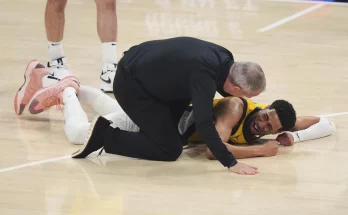In an era where women’s basketball is witnessing a meteoric rise in viewership, intensity, and fanfare, two names have emerged as the defining faces of the sport: Angel Reese and Caitlin Clark. Both are dynamic, unapologetically confident, and among the most marketable athletes in professional women’s sports today. But as their rivalry intensifies on the court in the WNBA and speculation swirls about Team USA’s roster ahead of the Paris 2024 Olympics, a storm of rumors recently erupted — fueled by social media, clickbait, and speculation.
The most recent — and most explosive — of these: Did Angel Reese actually threaten to leave the U.S. or refuse to join Team USA if Caitlin Clark is on the roster?
Let’s unpack the truth, the rumors, and the impact of this narrative on women’s basketball.
The Origin of the Controversy
The wildfire started with a viral Facebook post and TikTok video that claimed Reese had said she’d “leave the country” if Clark was named to Team USA. The social media frenzy quickly spiraled, with users sharing edited images, fake quotes, and exaggerated headlines. Most of these sources offered no direct quotes, no interviews, no official statements, just heavily implied drama and sensationalism.
Unfortunately, these kinds of unfounded claims thrive in the age of online virality — and when you attach them to two of the most talked-about players in the sport, they spread even faster.
But let’s be clear: as of now, there is no public record, verified quote, or press conference in which Angel Reese explicitly threatens to leave the United States or boycott Team USA because of Caitlin Clark. No such threat has been made in any professional or official context.
What Fuels the Rumors: A Rivalry Rooted in Respect?
The rivalry between Angel Reese and Caitlin Clark is the stuff of legend. It began in earnest during the 2023 NCAA Women’s Basketball Championship, where Reese’s LSU Tigers defeated Clark’s Iowa Hawkeyes. That game brought in record-breaking viewership and propelled both athletes into national stardom.
During the closing moments of the game, Reese famously flashed John Cena’s “you can’t see me” gesture — one Clark had previously used — before pointing to her ring finger. Critics labeled the moment unsportsmanlike, but others praised Reese for her competitive fire. It reignited a longstanding conversation about double standards in sports, particularly how Black and white female athletes are treated by media and fans.
While the media often paints the rivalry as personal animosity, both athletes have consistently pushed back on that narrative. Reese has said she’s fine being the “villain” because it brings attention to the game. Clark has praised Reese’s game and has even defended her from unfair criticism.
Despite this public mutual respect, the appearance of a feud is potent — and it sells. This is the context in which social media fabricated the “threat” of Angel Reese boycotting Team USA.
Team USA, Politics, and the Power of Image
With the 2024 Olympics approaching, the roster for the USA Women’s National Basketball Team is a subject of heated debate. The talent pool is deep — veterans like A’ja Wilson, Breanna Stewart, and Diana Taurasi are expected locks. The question that divides fans and pundits is whether Reese and/or Clark, both WNBA rookies, will make the cut.
Clark’s immense popularity and media presence make her a marketing dream for Team USA. On the court, she brings elite range, court vision, and an uncanny ability to energize crowds. Reese, meanwhile, is one of the best rebounders in the country, plays with unmatched physicality, and brings undeniable swagger to the team dynamic.
But selecting one over the other — or both — becomes less about skill and more about narrative. Will the Olympic committee opt for experience, or will they ride the wave of new-era popularity and social media stardom? Either way, fans are bracing for controversy.
That’s where the fabricated story of Reese’s “threat” comes into play. It taps into a real anxiety: what happens when a high-profile rivalry becomes a locker room issue? Will the players be able to set aside the media narratives and focus on representing their country?
Angel Reese’s Real Stance: Setting the Record Straight
Angel Reese has never been one to hold back. Her authenticity is one reason she’s amassed a loyal following — dubbed the “Bayou Barbie” — and why she resonates with a younger generation of athletes who value self-expression over traditional sports decorum.
While she hasn’t directly addressed the specific rumor about boycotting Team USA over Caitlin Clark, she has spoken extensively about her critics, her mindset, and her priorities.
In a post-WNBA draft interview, Reese stated:
“I know who I am. I know what I bring. I don’t need to be liked by everyone. I’m here to win, grow the game, and be myself.”
That doesn’t sound like someone ready to throw away a shot at Olympic gold over a teammate. Reese has worked too hard to let rumors define her narrative. She’s focused on building her professional career, leading the Chicago Sky, and becoming a role model for future athletes.
If selected, there’s no real evidence to suggest she would ever refuse an Olympic roster spot — especially not because of another player.
Caitlin Clark: Caught in the Crossfire
While Reese has been the focus of the rumor, Caitlin Clark has also had to navigate the intense spotlight. She entered the WNBA as the No. 1 overall pick by the Indiana Fever, carrying sky-high expectations and an even bigger media footprint.
Clark’s rise has been meteoric, but it’s come with its own burdens. Every foul she draws, every screen she navigates, every stare-down becomes headline material. Like Reese, Clark is often asked to speak on the perceived rivalry — and she’s always taken the high road.
In a recent press appearance, Clark stated:
“We’re competitors. That’s what we do. But I respect [Angel’s] game. There’s room for all of us to shine.”
Clark hasn’t fed into the fake drama. Instead, she’s focused on delivering highlight-reel plays, adjusting to WNBA-level defense, and continuing to draw record-breaking crowds wherever she plays.
What This All Says About Women’s Sports
The Reese-Clark narrative — real or imagined — is exposing both the beauty and the challenges of women’s sports in the media age.
On one hand, the attention is unprecedented. Women’s basketball is finally commanding prime-time TV slots, selling out arenas, and topping sports talk shows. These athletes deserve every ounce of the spotlight.
But with that spotlight comes scrutiny, clickbait, and rumor-mongering. The fake feud, the imaginary threats, the edited videos — it reflects a deeper issue: the tendency to reduce female athletes to drama rather than let their play speak for itself.
Rather than celebrate two elite competitors helping usher in a new era, the focus shifts to gossip and imagined beef. And that’s a disservice to the sport.
What’s Next: Paris and Beyond
As of this writing, the final roster for Team USA’s Olympic squad has not been released. Both Caitlin Clark and Angel Reese are long shots — not because of talent, but because of how competitive the selection process is and how few rookie players are usually chosen for Olympic play.
Still, whether they make the team or not, their impact is undeniable. Reese and Clark have brought energy, fans, and mainstream attention to women’s basketball like never before. They are reshaping how the sport is consumed, marketed, and discussed.
And if they do end up wearing the red, white, and blue together? The ratings will be massive, the storylines dramatic — but most importantly, the game will win.
To sum it up: Angel Reese did not threaten to leave the U.S. or skip out on Team USA because of Caitlin Clark. That claim is a fabrication built on internet rumor mills, not facts.
Both athletes are passionate, driven, and focused on their respective careers. They represent the future of basketball — bold, unfiltered, and unafraid to challenge norms.
The sport doesn’t need fake feuds. It needs exactly what Reese and Clark bring: talent, intensity, personality, and a refusal to back down.



